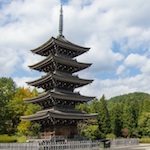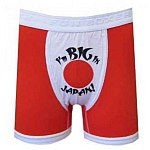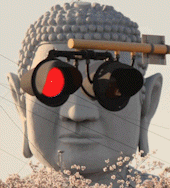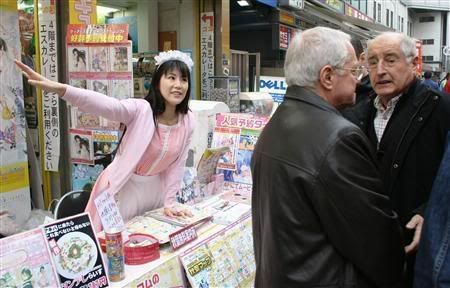| Hot Topics | |
|---|---|
Government Wants 20 Million Foreign Tourists In 2020
717,800 visited Japan in September (+34% y-o-y), the first time the numbers have exceeded 700,000 in that calendar month. This included 193,800 Koreans (+83.7%) and 137,500 Chinese (+39.3%). Most Chinese visitors already paid for their trips before the Senkaku conflict erupted so any effect will show up first in October data. Bookings are said to have dried up but no-one has any forecasts. So far this year, Chinese visitors have totalled 1,178,000.
-

Mulboyne - Posts: 18608
- Joined: Thu May 06, 2004 1:39 pm
- Location: London
i'm curious, do they count tourists by the number of people who tick the 'tourist' box on the landing card? even though i tick the 'business' box, i get the same temporary visitor stamp as tourists do.
-

Cyka UchuuJin - Posts: 2007
- Joined: Wed Jul 11, 2007 7:39 pm
- Location: Here, there, and everywhere.
Cyka UchuuJin wrote:i'm curious, do they count tourists by the number of people who tick the 'tourist' box on the landing card? even though i tick the 'business' box, i get the same temporary visitor stamp as tourists do.
It's all visitors, which is the same way other countries count the numbers. Japan wants to increase the total number which is why they are also looking at how to attract more international conferences and developing medical tourism.
-

Mulboyne - Posts: 18608
- Joined: Thu May 06, 2004 1:39 pm
- Location: London
Mulboyne wrote:...they are also looking at how to attract more international conferences....
They should consider the Cone of Silence...
Je pète dans votre direction générale
 8O8O8O8O8O
8O8O8O8O8O
Tiocfaidh ar la
Tiocfaidh ar la
-

Screwed-down Hairdo - Maezumo
- Posts: 6722
- Joined: Wed May 20, 2009 7:03 pm
Mulboyne wrote:It's all visitors, which is the same way other countries count the numbers. Japan wants to increase the total number which is why they are also looking at how to attract more international conferences and developing medical tourism.
ok. so it's not just tourists they're going after. which is smart, because business visitors spend a lot more than tourists. but with the yen so strong, i can't really see many conferences though. not with hong kong so close by (and more central for travel).
by medical tourism, i am assuming you mean plastic surgery. i can't see that taking off either though, again because of the strong yen and because places like thailand have got top notch surgeons at half the price of korea even.
-

Cyka UchuuJin - Posts: 2007
- Joined: Wed Jul 11, 2007 7:39 pm
- Location: Here, there, and everywhere.
Cyka UchuuJin wrote:by medical tourism, i am assuming you mean plastic surgery.
It includes any time an individual travels to another country to pay for medical treatment there. A lot of procedures will be elective but some could be life-saving. Japan thinks it has an edge in basic health check-ups because the country already has an enormous infrastructure for them and the hospitals wanting that kind of business have top end equipment. The main target is the Chinese middle class. Japan may not be popular on the streets of the Middle Kingdom but, unlike most other Asian countries, they do use kanji and that's an additional degree of comfort for a Chinese patient in an overseas hospital.
All developed countries have some kind of medical tourism business because they have better facilities on average than many of their neighbours. The trend is more pronounced in developing countries where the differences in care are starker. Nevertheless, a place like Costa Rica treats a lot of Americans and some countries develop specialities which attract patients from much wealthier nations e.g Thailand and sex changes.
-

Mulboyne - Posts: 18608
- Joined: Thu May 06, 2004 1:39 pm
- Location: London
Mulboyne wrote:It includes any time an individual travels to another country to pay for medical treatment there. A lot of procedures will be elective but some could be life-saving. Japan thinks it has an edge in basic health check-ups because the country already has an enormous infrastructure for them and the the hospitals wanting that kind of business have top end equipment. The main target is the Chinese middle class. Japan may not be popular on the streets of the Middle Kingdom but, unlike most other Asian countries, they do use kanji and that's an additional degree of comfort for a Chinese patient in an overseas hospital.
All developed countries have some kind of medical tourism business because they have better facilities on average than many of their neighbours. The trend is more pronounced in developing countries where the differences in care are starker. Nevertheless, a place like Costa Rica treats a lot of Americans and some countries develop specialities which attract patients from much wealthier nations e.g Thailand and sex changes.
thailand has got a lot more of a hold on the plastic surgery market than just sex changes. but it certainly is rooted in it...if you're a woman going for lipo/boob jobs/facelifts, then someone who specialises in sculpting female forms out of masculine ones is certainly a good one to go to.
i see what you mean by the basic medical care for chinese and the use of kanji. will be interesting to see how that develops.
-

Cyka UchuuJin - Posts: 2007
- Joined: Wed Jul 11, 2007 7:39 pm
- Location: Here, there, and everywhere.
Iraira wrote:Ew...she told me it was chocolate and I tried to suck the stains out for about 30 minutes. Tasted nutty, she must have a high fiber diet.
Sounds like one of Coligny's German movies...
Je pète dans votre direction générale
 8O8O8O8O8O
8O8O8O8O8O
Tiocfaidh ar la
Tiocfaidh ar la
-

Screwed-down Hairdo - Maezumo
- Posts: 6722
- Joined: Wed May 20, 2009 7:03 pm
Mulboyne wrote:...The 2009 budget for the new Tourist Agency was 6.3 billion yen and this will now be raised to 25.7 billion yen versus the Agency's own provision claim for only 7.2 billion. There's talk of TV commercials in Korea and China along with the development of structures to make tourism an important pillar of the economy.
The review process has now taken a chunk out of the Tourism Agency budget. There's talk of a one third cut but I think that number refers to part of the Tourism Agency budget rather than their total funding.
Specifically, it seems there'll now be less money available for the Agency to promote the country as a destination for international conferences and less money to produce Visit Japan promotional materials.
One source (Japanese)
-

Mulboyne - Posts: 18608
- Joined: Thu May 06, 2004 1:39 pm
- Location: London
Mulboyne wrote:The review process has now taken a chunk out of the Tourism Agency budget. There's talk of a one third cut but I think that number refers to part of the Tourism Agency budget rather than their total funding.
Specifically, it seems there'll now be less money available for the Agency to promote the country as a destination for international conferences and less money to produce Visit Japan promotional materials.
One source (Japanese)
I think Japan would become a far more appealing tourist destination if potential visitors got onto a Google search instead of being inundated with the incomprehensible dribble thr Tourism Agency produces. This can only be a boon for Japan.
Je pète dans votre direction générale
 8O8O8O8O8O
8O8O8O8O8O
Tiocfaidh ar la
Tiocfaidh ar la
-

Screwed-down Hairdo - Maezumo
- Posts: 6722
- Joined: Wed May 20, 2009 7:03 pm
Mulboyne wrote:The review process has now taken a chunk out of the Tourism Agency budget. There's talk of a one third cut but I think that number refers to part of the Tourism Agency budget rather than their total funding.
Specifically, it seems there'll now be less money available for the Agency to promote the country as a destination for international conferences and less money to produce Visit Japan promotional materials.
One source (Japanese)
According to that article it seems to be a 1/3 cut on top of a 1/2 cut at last year's review. That's quite a lot. Don't know whether this will actually get through to the budget though, because the government sees promoting tourism as part of its growth strategy.
If they'd just stop spending money on stupid slogans.
_/_/_/ Phmeh ... _/_/_/
-

Yokohammer - Posts: 5090
- Joined: Tue Sep 30, 2008 6:41 pm
- Location: South of Sendai
Nikkei: Japan Far From Goal Of 10mn Visitors This Year
Japan saw an 11% year-on-year increase in foreigner tourists in October, a significant drop in growth from September, owing mainly to the first decrease in Chinese arrivals in nine months. The Japan National Tourism Organization (JNTO) reported the figures Wednesday. The number of visiting foreigners had risen 34% in September.
Some 727,600 foreigners traveled to Japan last month, making for a total of about 7.33 million for January through October. With just two months to go, the chances of reaching the government's full-year goal of 10 million visitors appear dim.
In the wake of a territorial row between Japan and China, the number of Chinese visitors fell 1.8% on the year to 106,400 in October, compared with a jump of about 40% in September. Chinese tourism is still down, and the figures for November and December may also slip below year-earlier levels.
The government has set various tourism targets, including a goal of 25 million foreign visitors in 2019. But the financial crisis and subsequent economic slump stunted growth in pleasure travel, and the recent spat with China over the Senkaku Islands has only made the situation worse. The Japan Tourism Agency will consider revising the targets.
-

Mulboyne - Posts: 18608
- Joined: Thu May 06, 2004 1:39 pm
- Location: London
CNN: World's top destinations for 2011
$40 a night in Tokyo - in this century? In a capsule hotel, maybe.
According to this CNN article, Japan is #7, between #6 Albania (WTF?), and #8 Guatemala (NY is #1 BTW).
7. Japan
Many people still have the misconception that Japan is too expensive to visit, but once you get there, it can be more affordable than a vacation in New York, Reid said.
Why go in 2011? The country is ramping up its tourism marketing efforts after some recent disappointing years, so the number of visitors is expected to rise soon.
"We think that the crowds are going to get worse. Maybe it's time to think about it now," Reid said.
For help with booking an affordable stay, he recommended visiting the International Tourism Center of Japan and looking into minshuku, traditional guest houses that offer very simple but clean and inexpensive accommodations. You might pay $40 a night in Tokyo, for example.
$40 a night in Tokyo - in this century? In a capsule hotel, maybe.
According to this CNN article, Japan is #7, between #6 Albania (WTF?), and #8 Guatemala (NY is #1 BTW).
-

BigInJapan - Maezumo
- Posts: 1140
- Joined: Thu May 14, 2009 6:45 pm
- Location: Down south (but from the Great White North)
BigInJapan wrote:CNN: World's top destinations for 2011
$40 a night in Tokyo - in this century? In a capsule hotel, maybe.
While one can stay in Tokyo relatively cheaply, $40 per night sounds unrealistically low unless, as you point out, it's a capsule or a youth hostel barrack.
The cheapest I've stayed in Tokyo was JPY 5,250 per night.
At a ryokan, J-style room and public bath. Quite pleasant.
Never criticize anyone until you've walked several kilometres in their shoes.
Because
1. You're now several kilometres away; and
2. You've got their shoes.
Because
1. You're now several kilometres away; and
2. You've got their shoes.
-

Typhoon - Maezumo
- Posts: 778
- Joined: Mon Dec 12, 2005 6:26 am
Typhoon wrote:While one can stay in Tokyo relatively cheaply, $40 per night sounds unrealistically low.
I think 5-to-8,000 yen ($60-95 USD) price range would make finding a good place a lot easier. Several FG members have stayed at the Sawanoya Ryokan, which an ok place (but feels Japanesey semai/cramped).
- SAWANOYA RYOKAN (Traditional Japanese Inn)
5,040yen/night ($60 USD/night )
- Sakura Ryokan ( Ueno Asakusa Iriya )
4,175 yen/night ($50.73 USD/night)
Sanya skid row turning into service area for foreign tourists
TOKYO, Sept. 7 (AP) - (Kyodo)--Tokyo's Sanya district is now undergoing redevelopment which some observers say is turning one of Japan's biggest skid rows into an inexpensive version of Roppongi, a fancier area in central Tokyo where many foreigners hang out.
Low-cost guesthouses catering to foreign visitors and chic bars are now springing up in Sanya, an area straddling Arakawa and Taito wards known for decrepit accommodation patronized mainly by poor day laborers.
As an increasing number of older workers are quitting their jobs and leaving Sanya, the void is being filled by foreign visitors trying to tour Tokyo on the cheap.
"We've seen an increasing number of foreign guests who are quite knowledgeable about 'anime' and other Japanese subculture," said Tetsuo Kiyama, deputy head of Johoku Ryokan Kumiai, the area's local inn association.
Foreigners can often be seen cycling to nearby Akihabara, Tokyo's famous electronics district and subcultural center.
At 14 guesthouses that actively cater to foreigners, a one-night stay in a single room without meals starts from around 2,000 yen.
- TOKYO RYOKAN
Everyday it's the same low price at 3,500yen ($42.53 USD) a night a person including tax.
Two-Person-Room : 7,000yen a night per room
Three-Person-Room : 10,500yen a night per room
http://www.tokyoryokan.com/roomrate.htm
e-mail : tokyoryokan@ruby.dti.ne.jp
-

Taro Toporific - Posts: 10021532
- Images: 0
- Joined: Tue Sep 10, 2002 2:02 pm
-

BigInJapan - Maezumo
- Posts: 1140
- Joined: Thu May 14, 2009 6:45 pm
- Location: Down south (but from the Great White North)
+

 Via tokyoreporter.com -- cartoon by Politicomix
Via tokyoreporter.com -- cartoon by Politicomix

 Via tokyoreporter.com -- cartoon by Politicomix
Via tokyoreporter.com -- cartoon by Politicomix-

Taro Toporific - Posts: 10021532
- Images: 0
- Joined: Tue Sep 10, 2002 2:02 pm
The Yomiuri wants you.
Yomiuri: Tourist welcome mat good for the economy
Yomiuri: Tourist welcome mat good for the economy
On busy streets these days, it is not unusual to overhear passersby conversing in Chinese or Korean. The number of foreign tourists visiting Japan reached a record 8.6 million in 2010, a bit shy of the 10 million targeted by the government. A sharp increase in the number of tourists from Asia contributed to the record figure. As a major pillar for its new growth strategy, the government aims to boost the number of foreign tourists to 20 million by 2016 and eventually 30 million annually.
An increase in the number of foreign tourists is expected to have a big ripple effect across the Japanese economy as it helps expand domestic consumption and create job opportunities. In addition, people-to-people exchanges across national borders have the valuable effect of deepening mutual understanding. The government must continue its efforts to make Japan a more tourism-oriented country. Statistics on foreign tourists to Japan and Japanese tourists overseas show that the latter overwhelmingly exceed the former. The number of Japanese who visited foreign countries totaled 16.64 million last year while that of foreign tourists visiting here accounted for merely half of that figure. If this gap can be bridged by highlighting the allure of Japan, it will be possible to come a step closer to achieving the numerical target set by the government.
===
Asia holds the key
Holding the key to this is Asia, where the population of middle-income earners has been increasing rapidly. An overseas tour boom, the magnitude of which can be likened to that seen in 1970s Japan, is accelerating in Asian countries where more and more people are becoming prosperous enough to afford foreign tours. The number of tourists from South Korea, China, Taiwan and Hong Kong came to 5.63 million in 2010, more than double the 2.59 million recorded in 2001. It is vital to establish a system that can continue this upward trend. For that purpose, it is essential to increase the depth and variety of tour programs beyond those that simply make a circuit of such standard itinerary points as Kyoto, Nara and Tokyo's Akihabara district.
In recent years, scenic spots in such regions as Tohoku and Kyushu have become increasingly popular because they offer foreign tourists chances to feel a sense of seasonal changes while soaking in hot springs or enjoying panoramic views of natural beauty. Chinese and South Korean tourists have thronged sites in Hokkaido and Akita Prefecture that were used as locations for shooting popular movies and TV dramas. To help create more such spots, it is necessary for authorities to cooperate with foreign media operations that are sensitive to consumer trends in their own countries.
===
New tourism resources
If local governments and businesses take advantage of foreign tourists' mounting interest in Japan's regional areas, it will be possible to create new tourism resources. This could lead to revitalizing regional economies. The Tourism Agency plans to bolster its public relations and advertising activities. But it would not be effective to merely increase such activities haphazardly. We want the agency to exercise its wisdom and ingenuity to come up with ideas such as combining tourism with Japanese fashion, animation, cuisine and even medical treatment--fields that attract high foreign interest.
It is desirable to increase the amount of helpful signage in shopping areas as well as to improve services for foreigners at hotels and transport facilities. It is important for the public and private sectors to work together and share information in terms of both software and hardware for the promotion of tourism.
-

Mulboyne - Posts: 18608
- Joined: Thu May 06, 2004 1:39 pm
- Location: London
The Tourist Agency estimates visitors to Japan in 2010 spent Y1.15 trillion, an average of Y133,426 per head. Given that travel bookings have collapsed following the quake, that gives a rough guide to how much the economy stands to lose this year.
Source (Japanese)
Source (Japanese)
-

Mulboyne - Posts: 18608
- Joined: Thu May 06, 2004 1:39 pm
- Location: London
...Japanese Hoteliers Welcome 20 Million Hated Foreigners
--- AP Press
The Council for Japanese Hoteliers has confirmed the new target for
foreign visitors to Japan is "20 million annual visitors to Japan by 2020".
However when polled, a hefty 72% of the hoteliers claimed foreigners
would be unwelcome at their dwellings.
"Chinaman shit in bed.
No more questions, bignose.
ps, I am kokusaika."
- Japanese Hotelier.
A spokesman for the hoteliers went on to say "we are unable to support foreign differences.
Our facilities are not suited to foreigner. Food is Japanese food. Bathtub has water. Soup is
wet. All these Japanese things are too unique for foreign freak."
The Japan Tourism brochure for 2011 had this to say:Welcome to Japan!
Pay now, foreigner.
Thank you.
Now go sleep in park.
Japan Inn is No Vacancies.
Graph show gaijin tourist business on up and up!
Gaijin love park sleep!
You try too!
"This way to airport, park gaijin freak."
"First the inn tells us to 'fuck off' now this retarded princess woman
wants us to buy one of her kid-rooting comics?.... how much change
you got on you, Stan?"
-

Thanatos' embalmed botfly - Posts: 292
- Joined: Fri Aug 06, 2004 8:33 am
In another update (Japanese) Narita reports that the daily average number of foreign visitors going through immigration from 11th-31st March was 3,400. That's about a quarter of the number registered during the same period last year. Kansai airport took a quick tally between the 18th and the 23rd and found it to be down about a half from 2010.
-

Mulboyne - Posts: 18608
- Joined: Thu May 06, 2004 1:39 pm
- Location: London
The Tourist Agency has announced overseas visitor numbers in March were 352,800, down 50.8% from last year, the largest recorded year-on-year fall.
March numbers ought to have been fairly normal until the quake struck on the 11th so the drop in April may be greater still even if travellers begin to come back for the remaining days in this month.
March numbers ought to have been fairly normal until the quake struck on the 11th so the drop in April may be greater still even if travellers begin to come back for the remaining days in this month.
-

Mulboyne - Posts: 18608
- Joined: Thu May 06, 2004 1:39 pm
- Location: London
Just looking at the paper now and the headline says "Foreign Visitor Numbers Down 73%."
My sister wasn't allowed into the cuntry for a planned June visit. Not sure of the details, but she could not make an application with either an Australian or Irish passport.
My sister wasn't allowed into the cuntry for a planned June visit. Not sure of the details, but she could not make an application with either an Australian or Irish passport.
Je pète dans votre direction générale
 8O8O8O8O8O
8O8O8O8O8O
Tiocfaidh ar la
Tiocfaidh ar la
-

Screwed-down Hairdo - Maezumo
- Posts: 6722
- Joined: Wed May 20, 2009 7:03 pm
Well, like I said in another post, Narita was empty when I got back from spring break.
The immigration counters at arrivals were completely shut down and we had to redirect to a different area that was set up with just a couple of windows.
(to save power no doubt)
On the plane itself, less than a dozen gaijin.
The immigration counters at arrivals were completely shut down and we had to redirect to a different area that was set up with just a couple of windows.
(to save power no doubt)
On the plane itself, less than a dozen gaijin.
Fucked Dolphin
-

AML - Maezumo
- Posts: 194
- Joined: Wed Sep 08, 2010 11:40 am
Thanatos' embalmed botfly wrote:...
He, he - good to see Teb posting. The hotel ref was a good laugh, I've heard first hand of gaijin that speak good Japanese (and I mean good as they've done the level tests etc) told at business hotels that "No foreigners because they can't speak Japanese and this will cause misunderstanding". The entire conversation between said gaijin and fuckwit J hotel staff was in Japanese.
Screwed-down Hairdo wrote:Just looking at the paper now and the headline says "Foreign Visitor Numbers Down 73%."
My sister wasn't allowed into the cuntry for a planned June visit. Not sure of the details, but she could not make an application with either an Australian or Irish passport.
Why fucking not? Not like she applied during March while it was all going down?:confused:
- rooboy
- Maezumo
- Posts: 316
- Joined: Fri Feb 03, 2006 2:19 pm
- Location: Laughing about lonely McTojo pretending he's with jukujos
Best Countries for Expats
Japan doesn't make the list: http://www.cnbc.com/id/34259482?slide=1
-

cstaylor - Posts: 6383
- Joined: Mon Apr 29, 2002 2:07 am
- Location: Yokohama, Japan
cstaylor wrote:Japan doesn't make the list: http://www.cnbc.com/id/34259482?slide=1
Damn! Don't let Canman and the boys see this list.....
"There are those that learn by reading. Then a few who learn by observation. The rest have to piss on an electric fence and find out for themselves!"- Will Rogers

-

Greji - Posts: 14357
- Joined: Fri Jun 25, 2004 3:00 pm
- Location: Yoshiwara
Greji wrote:Damn! Don't let Canman and the boys see this list.....
Canada, huh. "Good places for expats," not "good places to retire" (although the "banana belt" around Victoria isn't too hellish).
BTW, what countries are the main exporters of expats? That would be Mehico, natch, and coming up Number Two would be, not The Philippines, not Pakistan, not India, not Indonesia, but...the UK!
"If there's a river, we'll dam it, and if there's a tree, we'll ram it - 'cause we Japanese are talkin' progress!"
-

Catoneinutica - Posts: 1953
- Joined: Tue Jan 24, 2006 12:23 pm
Looks like the list was made by somebody whose never gone near some of those cuntries.
Hong Kong - Great if you loved playing 'sardines' as kids, love tryin to walk down a jammed street nearly every fucking hour esp in revolting summer where you gotta change your clothes every 15 mins unless you're one of the locals used to it. If you love living in soulless high rises, yeah.
'Making friends"? Now Cantonese are okay people and the ones in Oz are the same. But Cantonese in Hong Kong usually dont have any fucking friends outside their families. Hong Kong natives are as interesting in Hong Kong re social life as that fucking mouldy smell thats always in Hong Kong.
Singapore? If you wanna live in a fascist type state where people are caned for fucking trifling offences, that's ultra-expensive, has shitty high rise living and is proud to have a system where the original natives have an apartheid system to give em jobs and privileges over the other natives who didn't go there much later.
Thailand? Yeah, if you wanna spend your life seeing Thais exploiting and being exploited by some horrible, sus westerners incl criminals who are attracted to children and should be fucking strung up by their feet and had for target practice. Instead the Thai govt gives these sickos visas. And don't forget you need all that extra cash to pay off the police cause you walked past em.
Australia? Was good once but now a lot of people who aint done shit for Oz, never contributed a half cent, have nothing to do with our history, wouldnt know democracy or women's/kids' rights in literally 5,000 yrs or more, and didnt know we existed til fucking crime syndicates ferried their cuntrymen and women across on boats and discovered they can get paid to barge in and screech and burn down accommodation til they get fastracked for residency and then send working Aussie's taxpayer dollars back to their hellholes to bring more of em out are fucking up Australia.
If you wanna pay for these fuckers and others who at least have connections with Oz and are part of it but don't wanna do shit and get paid for it, if you wanna pay one of the highest tax rates in the world relative to your income for all this waste, and if you wanna pay for slimey arseholes like handbag bipolar Kevie Rudd and Juliar Gillard:twisted: to screw you up the kyber so they can build 7 million dollar houses on the Gold Coast while ordinary Aussies pay yet another new tax (this time a carbon tax) cause China and Mongolia are fucking up the world's air, then go on over.
You'll see lots of fucking changes if you go to live in Oz - none of em good, its going down the drain faster than you can say "Quality life is now dead".
Hong Kong - Great if you loved playing 'sardines' as kids, love tryin to walk down a jammed street nearly every fucking hour esp in revolting summer where you gotta change your clothes every 15 mins unless you're one of the locals used to it. If you love living in soulless high rises, yeah.
'Making friends"? Now Cantonese are okay people and the ones in Oz are the same. But Cantonese in Hong Kong usually dont have any fucking friends outside their families. Hong Kong natives are as interesting in Hong Kong re social life as that fucking mouldy smell thats always in Hong Kong.
Singapore? If you wanna live in a fascist type state where people are caned for fucking trifling offences, that's ultra-expensive, has shitty high rise living and is proud to have a system where the original natives have an apartheid system to give em jobs and privileges over the other natives who didn't go there much later.
Thailand? Yeah, if you wanna spend your life seeing Thais exploiting and being exploited by some horrible, sus westerners incl criminals who are attracted to children and should be fucking strung up by their feet and had for target practice. Instead the Thai govt gives these sickos visas. And don't forget you need all that extra cash to pay off the police cause you walked past em.
Australia? Was good once but now a lot of people who aint done shit for Oz, never contributed a half cent, have nothing to do with our history, wouldnt know democracy or women's/kids' rights in literally 5,000 yrs or more, and didnt know we existed til fucking crime syndicates ferried their cuntrymen and women across on boats and discovered they can get paid to barge in and screech and burn down accommodation til they get fastracked for residency and then send working Aussie's taxpayer dollars back to their hellholes to bring more of em out are fucking up Australia.
If you wanna pay for these fuckers and others who at least have connections with Oz and are part of it but don't wanna do shit and get paid for it, if you wanna pay one of the highest tax rates in the world relative to your income for all this waste, and if you wanna pay for slimey arseholes like handbag bipolar Kevie Rudd and Juliar Gillard:twisted: to screw you up the kyber so they can build 7 million dollar houses on the Gold Coast while ordinary Aussies pay yet another new tax (this time a carbon tax) cause China and Mongolia are fucking up the world's air, then go on over.
You'll see lots of fucking changes if you go to live in Oz - none of em good, its going down the drain faster than you can say "Quality life is now dead".
- rooboy
- Maezumo
- Posts: 316
- Joined: Fri Feb 03, 2006 2:19 pm
- Location: Laughing about lonely McTojo pretending he's with jukujos
Who is online
Users browsing this forum: No registered users and 7 guests





